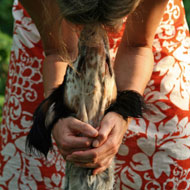Pets 'can help with long-term mental health issues'

Sixty per cent placed their pets in the central 'most important' circle.
New research published in BMC Psychiatry suggests pets can help their owners with the management of long-term mental health conditions.
Researchers from the University of Manchester interviewed 54 adults under the care of community-based mental health services, who had been diagnosed with severe mental illnesses. The participants were asked to rate the importance of, for example, their family, friends, pets, healthcare professionals and hobbies.
Factors were rated by placing them in one of three concentric circles - the central one being the most important, the middle being of secondary importance and the outer circle of lesser importance.
Sixty per cent placed their pets in the central 'most important' circle, while 20 per cent put them in the middle circle.
The consistent presence and close physical proximity of pets was described as an immediate source of calm and therapeutic benefits to owners. Participants felt their pets played a range of positive roles, including distracting them from their symptoms and helping them to manage the stigma associated with mental health issues by providing acceptance without judgement.
Pets were also considered valuable in times of crisis, giving unconditional support that people were often not receiving from their family or social relationships.
Despite these benefits, pets were not considered or incorporated in any of the participants' individual care plans.
Lead author Dr Helen Brooks said: "These insights provide the mental health community with possible areas to target intervention and potential ways in which to better involve people in their own mental health service provision through open discussion of what works best for them."



 The Animal and Plant Health Agency (APHA) has updated its online reporting service for dead wild birds.
The Animal and Plant Health Agency (APHA) has updated its online reporting service for dead wild birds.